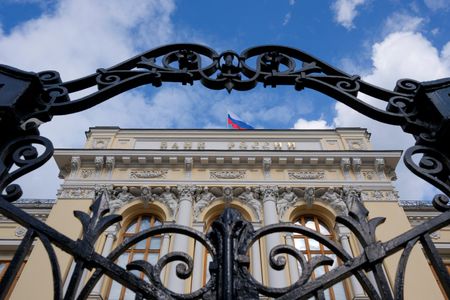 1
1 1
1
By Elena Fabrichnaya and Alexander Marrow
MOSCOW (Reuters) – Only five transactions involving foreign companies selling assets in Russia since October have involved payments to non-residents above $400 million, the Bank of Russia said on Friday, playing down the impact of such deals on financial stability.
From telecoms companies to fashion retailers, thousands of firms halted operations in Russia last year as Western governments imposed sanctions after Moscow despatched troops to Ukraine.
Some managed to negotiate swift exits, often selling at huge discounts or handing the keys to local management. The central bank on Friday said around 200 deals had been completed between March 2022 and March 2023, with just 20% of those involving large asset sales, those in excess of $100 million.
“The impact of foreign investors selling their subsidiaries in Russia is not significant on an economic scale,” the central bank said in a financial stability report.
The bank played down the impact of Western exits on the FX market when the rouble tumbled in early April, but the Kremlin plans to introduce a $1 billion monthly cap from June of foreign currency residents can buy to settle such deals.
“The large volume of foreign currency purchases needed for settling transactions, in the context of the shrinking current account surplus in Russia’s balance of payments, may have a negative impact on the foreign exchange market, so buyers are advised to distribute FX purchases evenly,” the central bank said.
The central bank sits on a government commission that monitors foreign investment, which gives approval for transactions and has demanded that exiting firms sell assets at a discount of at least 50%.
The commission seeks to mitigate risks to financial stability by giving priority to buyers with relevant industry experience, the central bank said.
Many withdrawing companies have included buyback clauses, something the central bank said helped business to continue operating without interruption.
(Reporting by Elena Fabrichnaya and Alexander Marrow; Editing by Hugh Lawson)